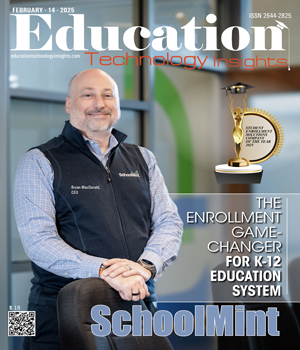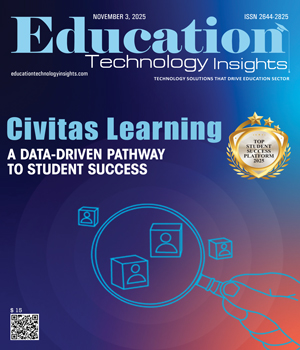THANK YOU FOR SUBSCRIBING
Be first to read the latest tech news, Industry Leader's Insights, and CIO interviews of medium and large enterprises exclusively from Education Technology Insights
Navigating Transformative Shifts in Higher Education Leadership
Troy Hahn, Chief Information Officer and Assistant Vice President, Queens College
 Troy Hahn, Chief Information Officer and Assistant Vice President, Queens College
Troy Hahn, Chief Information Officer and Assistant Vice President, Queens CollegeTroy Hahn, the Chief Information Officer and Assistant Vice President at Queens College spearheads strategic planning for information technology and academic innovation. Having more than 15 years in higher education management, finance, and international development, he contributes a diverse perspective to leadership. Troy's passion lies in crafting online learning programs and co-authoring publications on multigenerational audiences. Committed to quality and accessibility, he collaborates seamlessly with IT professionals and external partners. Troy's dedication extends to fostering a learning-centered environment focused on excellence, shared governance, and continuous improvement within the campus community.
In an exclusive interview with Education Technology Insights, Hahn shares valuable insights on the challenges, trends, and best practices in the Education Quarter Leads space.
Could you share the trajectory of your leadership journey and personal growth within the industry? Additionally, could you outline your current roles and responsibilities as the Chief Information Officer at Queens College?
Throughout my sixteen-year tenure in higher education, starting at Auburn University and learning from the School of Fisheries, I gained valuable insights into how technology integrates with researchers, faculty, and students. This experience differed from the typical CIO role in land grant institutes. Managing various issues, such as research, grants, and support for Ph.D. candidates and students, while comprehending early facilities' effects on classrooms, faculty, and student affairs was key. A pivotal lesson learned was that technology is not merely a component but a crucial business partner shaping the destiny of the entire organization. This realization led me to transition from a versatile technician to a CIO at the State University of New York, Suffolk County Community College, focusing on bridging the gap between academic technology and administrative departments. Through this journey, I fostered a partnership between STEM and other disciplines, emphasizing the broader significance of technology and its integral role in the functioning of educational institutions.
“Technical colleges strategically move away from traditional certificates to access a larger, overlooked market, particularly in avionics and drone control.”
The recognition I received in the initial stages of my tenure at Medgar Evers College was crucial in overcoming financial uncertainties. It validated my skills, positioned me as a valuable asset, and enhanced my credibility. It also enabled me to advocate for strategic initiatives and contribute to the institution's success. Apart from this, having a technical background, the language often used in our sector is quite different from that used in the academic sector. To curb this issue, I worked to make this language more accessible to the college community. I do not get it right all the time, but the institution knows the attempt is there. This experience, allowed me start replicating similar successes at Queens College, highlighted the importance of nurturing partnerships, inclusivity, and diversity.
Assuming a leadership role in talent management amidst the adversities posed by the pandemic, I formed partnerships with new hires and invited faculty to participate in the search committee, facilitating a change in organizational mindset. Identifying biases in artificial intelligence, I advocated for diversity, resulting in a more inclusive and collaborative work environment.
The technical team's transition from Avaya to Microsoft Teams demonstrated their commitment to digital transformation through modernization, cost savings, and enhanced cloud-based system capabilities for hybrid distance learning. As CIO, I transitioned from a technician to a business leader, prioritizing efficiency and modern IT infrastructure, significantly impacting college operations and culture.
What are some pain points that you've been witnessing lately?
The first step in driving toward effective solutions involves acknowledging organizations' problems regarding employee retention and business continuity. It becomes imperative to delve into retirement planning and knowledge transfer, crucial for ensuring the organization's success. However, the perpetual need for crisis management stands as a hurdle, impeding the development of operational plans.
A critical concern comes to the forefront with the salary challenge, particularly for technology professionals within higher education institutions. This issue is exacerbated by the shifting priorities of the next generation, emphasizing short-term benefits and a three to five-year retirement outlook.
When focusing on the help desk industry, addressing the acknowledged turnover issue involves advocating for prioritizing employees' quality of life. The emphasis lies on sustaining a positive atmosphere and offering flexibility, steering away from rigid daily office requirements.
In my experience of guiding the technical difficulties in higher education, the focus revolves around meeting the evolving demands of students, especially those seeking adaptability in their educational journey. The notable shift towards distance education caters to students desiring more adaptable options beyond the conventional four-credit degree.
Technical colleges strategically move away from traditional certificates to access a larger, overlooked market, particularly in avionics and drone control. The benefits of hybrid courses and distance education extend beyond mere convenience, particularly for students managing multiple responsibilities, such as working mothers, fathers, and single parents. Offering resilience and diverse options proves crucial in addressing these varied needs. However, higher education's historical resistance to swift changes remains the challenge. Colleges that fail to adapt face financial struggles and closure, with public sector colleges potentially merging due to competition for conventional student enrollment. The path forward lies in traversing these hurdles with adaptability and strategic foresight.
How do you envision the future of the education space a couple of years down the line?
In education, the horizon gleams with promise thanks to visionary leadership encompassing presidents, CIOs, and provosts. Directing organizations through transformative changes is undeniably demanding , as it is hindered by human apprehension and a propensity to adhere to established patterns. However, the brilliance of the future is illuminated by the endeavors of daring leaders across the spectrum. These leaders fearlessly take risks, forming alliances with diverse departments and organizations.
The prospects are further accentuated by the transformation in academic leadership. As the baby boomer era retires, it paves the way for a new generation eager to prove its mettle in guiding the academic trajectory. The eagerness to embrace innovation is evident, with a profound willingness to integrate new technologies and infuse artificial intelligence into classrooms, thus streamlining the teaching experience. A generational transition that calls for passionate leaders to lead the next academic age and dynamic academic leadership is creating promising opportunities for the years to come.
Weekly Brief
Featured Vendor
Read Also
Empowering Educators through Purposeful, Connected and Transformative Learning
Empowering Students to Lead: A New Vision for Civic Learning
The Director's Playbook: Strategic Digital Transformation in Rual Hyper-Growth Districts
The Art and Architecture of Student Support
From At-Risk to At-Promise: The Language Revolution Higher Education Needs
Teaching Tomorrow: How Western Governors University Is Redefining Teacher Preparation

I agree We use cookies on this website to enhance your user experience. By clicking any link on this page you are giving your consent for us to set cookies. More info















-(2)-1.jpg)













